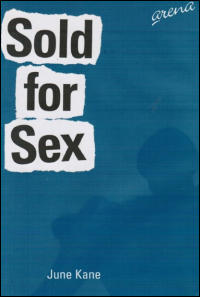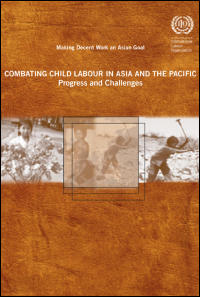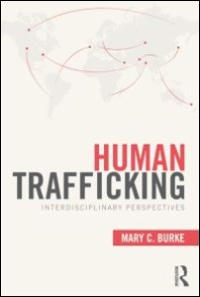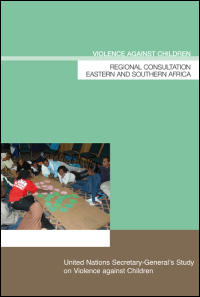Other reports and publications
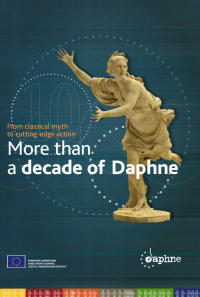
The Daphne Programme to combat violence against children, young people and women, was launched by the European Commission in 1997 as part of Europe’s response to public outrage at the deaths of a number of young women and children in Belgium abducted for sexual exploitation and trafficking.
It was a one-year programme with a modest funding line – one million Euros for NGO projects run in at least two EU member states – but so popular was it and such was its impact that the programme was renewed for another year, then for two years and, eventually, 10 years after its debut, with a budget now of 14 million Euros per cycle, it became a central pillar of EU efforts to address sexual violence.
In its tenth year, this publication was released to bring together some of the programme’s important lessons.
Download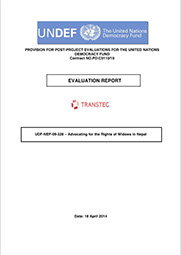
Between 2010 and 2016, Kane has been a member of a six-expert team visiting projects across the world designed to address issues of democracy, governance and leadership. Kane particularly focused on the role of young people and women. The projects were all supported by the United Nations Democracy Fund (UNDEF).
This report looks at an innovative project that aimed to help remote communities in the High Himalayas access their civic rights.
Download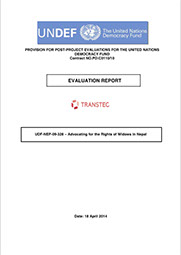
Between 2010 and 2016, Kane has been a member of a six-expert team visiting projects across the world designed to address issues of democracy, governance and leadership. Kane particularly focused on the role of young people and women. The projects were all supported by the United Nations Democracy Fund (UNDEF).
This report looks at a successful project that focused on improving the social and political status of widows in Nepal.
Download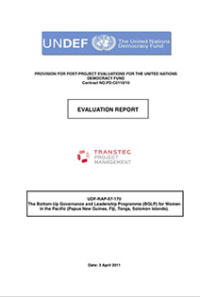
Between 2010 and 2016, Kane has been a member of a six-expert team visiting projects across the world designed to address issues of democracy, governance and leadership. Kane particularly focused on the role of young people and women. The projects were all supported by the United Nations Democracy Fund (UNDEF).
This project was an e-learning initiative that targeted women in rural areas of selected Pacific Islands.
Download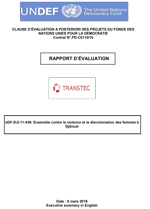
From 2010 to 2016, Professor Kane was a member of a six-expert team visiting projects across the world designed to address issues of democracy, governance and leadership. She particularly focused on the role of young people and women. The projects were all supported by the United Nations Democracy Fund (UNDEF).
This report of a women’s rights project in Djibouti may be of particular interest because it highlight fundamental flaws in the design of the programme.
The report is in French but there is an executive summary in English.
Download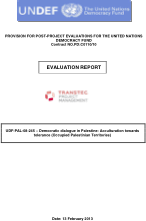
Between 2010 and 2016, Kane has been a member of an expert team visiting projects across the world designed to address issues of democracy, governance and leadership. Kane particularly focused on the role of young people and women. The projects were all supported by the United Nations Democracy Fund (UNDEF).
This report looks at a programme that aimed to address growing divisions among people in the Occupied Palestinian Territories (West Bank and Gaza Strip).
Download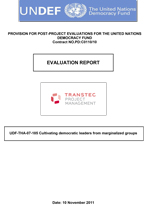
From 2010 to 2016, Professor Kane was a member of a six-expert team visiting projects across the world designed to address issues of democracy, governance and leadership. She particularly focused on the role of young people and women. The projects were all supported by the United Nations Democracy Fund (UNDEF).
This report looks at work to select and prepare leaders in marginalized groups in Thailand to step up and support efforts to strengthen democratic processes.
Download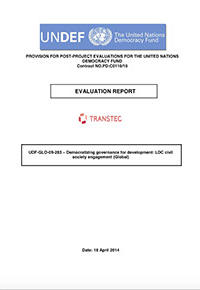
Between 2010 and 2016, Kane has been a member of a six-expert team visiting projects across the world designed to address issues of democracy, governance and leadership. Kane particularly focused on the role of young people and women. The projects were all supported by the United Nations Democracy Fund (UNDEF).
This global project led by a Kathmandu-based NGO tied in with UN processes on LDC development and focused on ensuring the voices of NGOs across the world were heard.
Download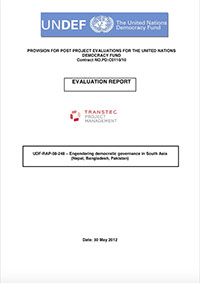
Between 2010 and 2016, Kane has been a member of a six-expert team visiting projects across the world designed to address issues of democracy, governance and leadership. Kane particularly focused on the role of young people and women. The projects were all supported by the United Nations Democracy Fund (UNDEF).
This report looks at a project run out of Nepal that included training and advocacy in South Asian countries around governance and democracy.
Download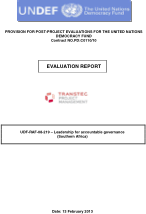
Between 2010 and 2016, Kane has been a member of an expert team visiting projects across the world designed to address issues of democracy, governance and leadership. Kane particularly focused on the role of young people and women. The projects were all supported by the United Nations Democracy Fund (UNDEF).
This report looks at a subregional project that brought together young people with leadership potential from states in southern Africa for a series of training programmes focusing on democracy and governance.
Download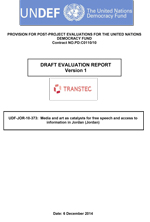
From 2010 to 2016, Professor Kane was a member of a six-expert team visiting projects across the world designed to address issues of democracy, governance and leadership. She particularly focused on the role of young people and women. The projects were all supported by the United Nations Democracy Fund (UNDEF).
This report looks at a project in Jordan that aimed to mobilize journalists and performers to support free speech and the sharing of information.
Download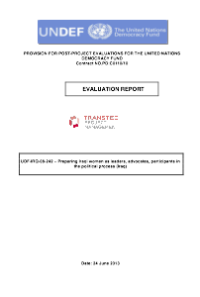
Between 2010 and 2016, Kane has been a member of a six-expert team visiting projects across the world designed to address issues of democracy, governance and leadership. Kane particularly focused on the role of young people and women. The projects were all supported by the United Nations Democracy Fund (UNDEF).
This report looks at a project that aimed to prepare women in Iraq to participate fully in democratic processes.
Download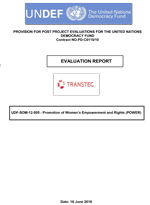
From 2010 to 2016, Professor Kane was a member of a six-expert team visiting projects across the world designed to address issues of democracy, governance and leadership. She particularly focused on the role of young people and women. The projects were all supported by the United Nations Democracy Fund (UNDEF).
This report looks at a project aiming “to contribute to inclusive development by empowering women with capacity to claim their rights in Somalia through increased participation in social, economic and political activities”. The project included training, awareness raising, networking and advocacy.
Download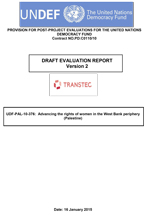
From 2010 to 2016, Professor Kane was a member of a six-expert team visiting projects across the world designed to address issues of democracy, governance and leadership. She particularly focused on the role of young people and women. The projects were all supported by the United Nations Democracy Fund (UNDEF).
This report looks at an interesting project run out of Ramallah, in the West Bank of Palestine, “to promote social change and empower women in the West Bank to increase their participation within local governance frameworks and positions… specifically in urban and environmental planning at the level of local councils, and to increase public awareness and support for women’s participation in local governance and urban and environmental planning”.
Download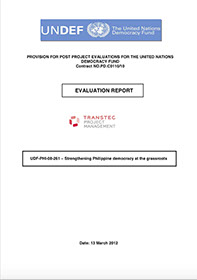
Between 2010 and 2016, Kane has been a member of a six-expert team visiting projects across the world designed to address issues of democracy, governance and leadership. Kane particularly focused on the role of young people and women. The projects were all supported by the United Nations Democracy Fund (UNDEF).
This report looks at a project that aimed to get marginalized groups involved in voting and to help them understand their rights and how to vote.
Download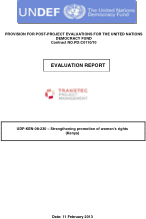
Between 2010 and 2016, Kane has been a member of an expert team visiting projects across the world designed to address issues of democracy, governance and leadership. Kane particularly focused on the role of young people and women. The projects were all supported by the United Nations Democracy Fund (UNDEF).
This report looks at an innovative and successful project in Kenya that was run by an organization founded by former and practising journalists. It focuses on bringing women and media professionals together so that the journalists have a better idea of the challenges and issues in women’s lives and so that the women have contacts in the media when they have stories to tell.
Download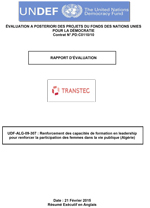
From 2010 to 2016, Professor Kane was a member of a six-expert team visiting projects across the world designed to address issues of democracy, governance and leadership. She particularly focused on the role of young people and women. The projects were all supported by the United Nations Democracy Fund (UNDEF).
This evaluation was undertaken remotely; there was no visit to the country although, for each UNDEF evaluation, Professor Kane worked with a local consultant. The project was in response to what the lead NGO considered to be the low participation of women in Algeria’s public life. The grantee argued that, despite national laws promoting gender equality and universal education to age 16, and notwithstanding the high profile of women in civil society organizations, the number of women standing for election in local and national elections, and being elected, had historically been low.
The project’s principal objective was to “build the capacity of women who are involved in NGOs, trade unions and political parties so that they have the confidence to participate in governance, particularly in local bodies”.
This report is in French, with an Executive Summary in English.
Download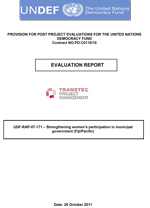
From 2010 to 2016, Professor Kane was a member of a six-expert team visiting projects across the world designed to address issues of democracy, governance and leadership. She particularly focused on the role of young people and women. The projects were all supported by the United Nations Democracy Fund (UNDEF).
This project began as an effort to improve the participation of women in local government in Fiji but was extended to other countries in the Pacific and broadened to focus on women’s participation in institutions and companies. The lead NGO was based in Australia and important lessons relating to this separation of lead agency and working team are suggested.
Download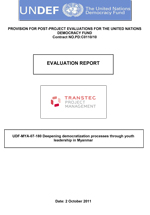
From 2010 to 2016, Professor Kane was a member of a six-expert team visiting projects across the world designed to address issues of democracy, governance and leadership. She particularly focused on the role of young people and women. The projects were all supported by the United Nations Democracy Fund (UNDEF).
This report evaluates a project which aimed to “foster a culture of youth leadership and debate to address the knowledge gaps by providing information and capacity to engage with local authorities around community entitlements, and to develop leadership potential.” It aimed to do this as an integral part of a broader initiative that had established a “youth fellowship” of young men and women (average age 25 years).
Download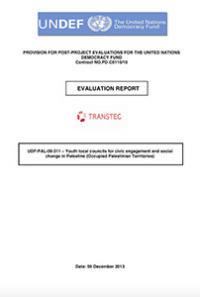
Between 2010 and 2016, Kane has been a member of a six-expert team visiting projects across the world designed to address issues of democracy, governance and leadership. Kane particularly focused on the role of young people and women. The projects were all supported by the United Nations Democracy Fund (UNDEF).
This report covers a youth project remotely evaluated in Myanmar.
Download
